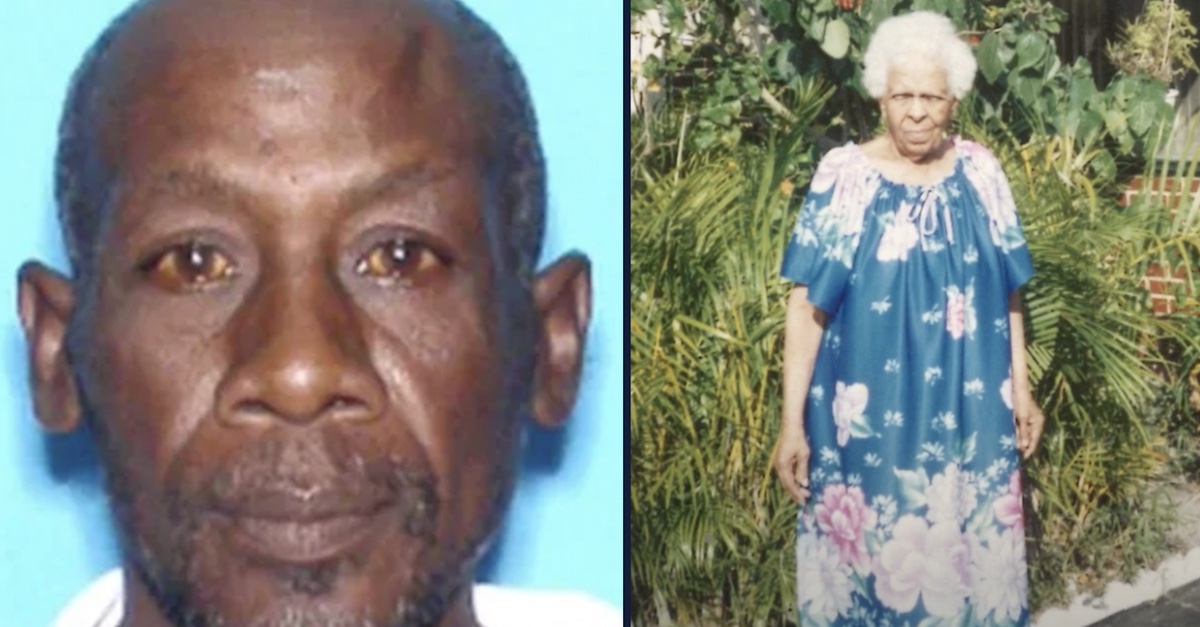
Johhny Mack Brown, Lillian DeCloe
Law enforcement authorities in Florida on Monday announced that investigators have identified the culprit in the cold case murder of an 89-year-old woman who was raped and strangled to death inside her home nearly 30 years ago.
Using new advances in DNA technology, investigators announced that they had identified Johnny Mack Brown as the assailant responsible for the horrific 1994 murder of Lillian DeCloe. Brown will never face justice in a court of law. He died more than a decade ago.
According to a press release from the Broward County Sheriff’s Office (BSO), DeCloe was relaxing inside of her Pompano Beach house on Saturday evening in April 1994 when “violence and rage burst into Lillian’s quiet, peaceful home” and an assailant sexually assaulted and killed the former nurse and teacher. The victim’s family spent decades wondering who would want to murder a harmless old woman, but answers were scarce.
The sheriff’s office Cold Case Unit reopened the case in 2019, launching “a journey through old case files, through DNA databases, and eventually to the grave of a former United States Marine who once lived a few houses away from Lillian’s home.”
“Like an episode of ‘CSI,’ a series of breakthroughs led to Lillian’s killer, and the first emerged from DNA evidence recovered from Lillian’s nightgown,” the release states. “The killer left semen on the garment after he sexually assaulted Lillian. From that evidence, BSO’s Crime Lab developed a suspect profile. The Florida Department of Law Enforcement (FDLE) then provided the second breakthrough.”
FDLE used the killer’s semen to conducted a familial search on its State of Florida Qualifying Offender DNA Database. The technique uses the DNA profile to search for the contributor’s father, son, or brother. The test identified an individual whose DNA was on file because he had spent time in a Florida prison and was a close relative of the individual who raped and killed DeCloe.
That connection led investigators to Brown, a Vietnam War veteran. Brown’s family told investigators that prior to his death he had struggled with drug addiction and PTSD.
Police said the final breakthrough in the case came in August, when detectives obtained a court order to exhume Brown’s remains from the South Florida National Cemetery in Palm Beach County.
“Investigators collected tissue samples from Brown’s remains, and testing by BSO’s Crime Lab showed that Brown’s DNA was consistent with the DNA left at the crime scene,” the release states. “The results were more than conclusive – the DNA results are 66.8 trillion times more likely that they came from Brown and DeCloe than if they came from DeCloe and another person.”
After detectives presented their findings to the Broward State Attorney’s Office, prosecutors agreed with the determination that Brown was responsible for DeCloe’s murder and the case “is now considered solved and exceptionally cleared,” the sheriff’s office said.
“When a murder is committed in any part of this county it creates a shockwave of devastation and fear and uncertainty and insecurity in the environment in which we live, and that doesn’t go away when a suspect dies,” Broward Sheriff Gregory Tony said at a Tuesday afternoon news conference.
Tony also said that investigators believe the murder might have happened amid a “burglary gone bad.”
“I think it was just the opportunity, he lived close by, only a few house down,” the sheriff said. “When he fell on hard times and he went homeless, and he had a drug habit, it indicated that he broke into the house, he may or may not known she was there alone, but she was 89, she lived by herself, and it looked like all the drawers were opened and things were gone through the house, like burglary gone bad. She must have confronted him, and it went from there.”
Watch the press conference below:
[Image via BSO]